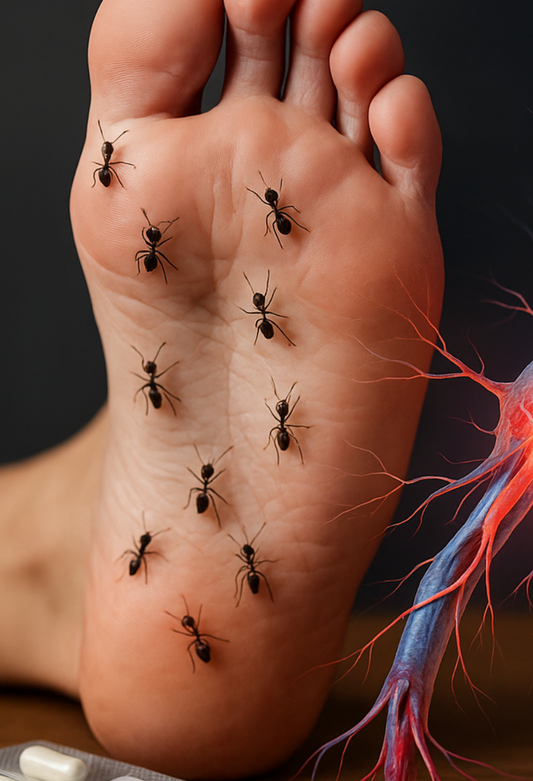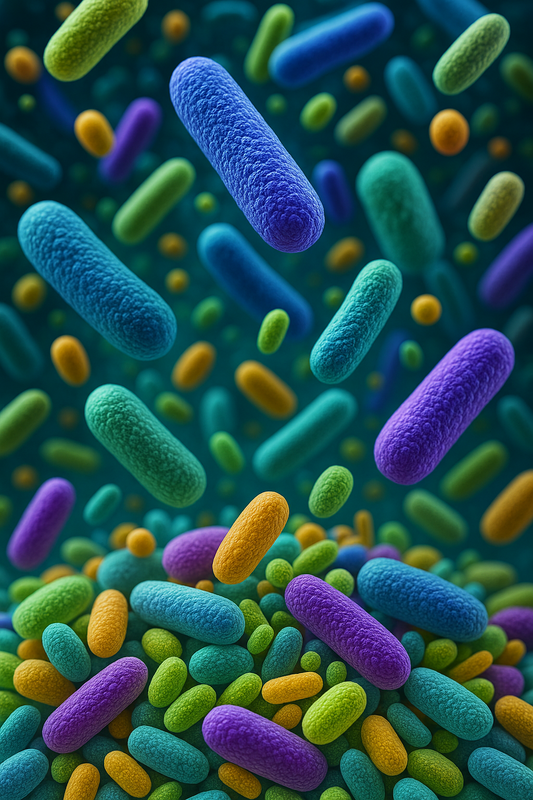Promote brain flexibility – exercises to strengthen mental performance
Our brain is a real miracle. It can change, adapt and even build new connections throughout our lives - a skill known as neuroplasticity. Imagine the brain as a large network that can constantly reconnect and adapt, similar to a tree that forms new branches to become stronger and more resilient. It is the key to us remaining mentally fit, creative and adaptable even as we get older. But how exactly does it work and what can you actively do to promote the flexibility of your brain? In this article, you will learn why neuroplasticity is so important and get practical tips on how you can specifically train it.
The Changeable Brain – How Neuroplasticity Makes Us Flexible
Neuroplasticity describes the brain's ability to create new neural connections and restructure existing networks. This process is stimulated by learning, experience and even physical exercise. At the molecular level, neurotransmitters such as glutamate and neurotrophic factors such as brain-derived neurotrophic factor (BDNF) play an important role. These substances promote the growth of new nerve cells and the formation of synapses, the connection points between nerve cells.
Studies, such as a 2019 study by the University of California, show that neuroplasticity is active at every age and helps us adapt to new situations. Another study from 2020 found that just a few weeks of intensive cognitive stimulation can significantly strengthen neural connections in the brain. Another study from the University of Texas showed that older adults who regularly challenge themselves mentally significantly reduce the risk of cognitive decline.
This means that no matter how old you are, your brain remains malleable as long as you challenge and encourage it. Interestingly, the role of glial cells - previously known as support cells in the brain - is also being increasingly researched. Recent findings show that they play an important role in the maintenance and formation of synapses, which further supports the process of neuroplasticity.
Why a flexible brain enriches your life
The benefits of neuroplasticity go far beyond learning. It affects our memory, our creativity and even our emotional resilience.
-
Better memory : A flexible brain stores information more efficiently and can recall it faster, making it easier for you to learn new skills or solve complex problems.
-
Protection from disease : Neuroplasticity may help lower the risk of Alzheimer's and dementia by strengthening mental reserve - a buffer that maintains important functions even when brain damage occurs. A Stanford University study found that people with higher cognitive reserve showed fewer symptoms of Alzheimer's, even when physical brain damage was present.
-
Mental health : An adaptable brain is more resilient to stress and depression, as researchers at Harvard Medical School found in a meta-analysis. Neuroplasticity promotes the release of endorphins and dopamine, which contributes to better emotional stability.
In short: Neuroplasticity is your personal key to a mentally fit and fulfilling life.
Train your brain like a muscle – exercises for more flexibility
Like muscles, your brain needs regular training to stay in top shape. These exercises not only promote your neuroplasticity, but are also fun:
-
Learn something new
Nothing activates neuroplasticity like learning new skills, as it activates different areas of the brain at the same time and creates new neural networks. This process helps the brain to remain more flexible and adapt to new challenges. Whether you're speaking a foreign language, playing an instrument or learning pottery, your brain loves variety. A study from the University of Cambridge showed that learning a new language can significantly increase neuronal density in the hippocampus, the center for memory and orientation.
-
Boost your memory
Games like Sudoku, chess or memory are not only entertaining, but also train your cognitive performance. They help to strengthen existing neural connections and create new ones. A recent study by the German Society of Neurology showed that regularly playing such games can reduce the risk of dementia by up to 25%.
-
Exercise regularly
Aerobic exercise such as jogging, cycling or dancing improves blood flow to the brain and supports the formation of new nerve cells. A study by the German Sport University Cologne found that regular exercise can reduce the risk of cognitive impairment by up to 30%. In addition, exercise promotes the release of the aforementioned BDNF, which supports the growth and connection of nerve cells.
-
meditation and mindfulness
Relaxation exercises such as meditation promote concentration and reduce stress hormones that can impair neuroplasticity. Just 10 minutes of daily meditation is enough to bring about measurable changes in the brain. A study by the University of California, Los Angeles showed that long-term meditators have an increased thickness of the cortex, which is responsible for attention and sensory processing.
-
Learn creative hobbies
Creative activities such as painting, writing or making music stimulate neuroplasticity by activating different areas of the brain simultaneously. A study by the University of Glasgow showed that creative activities improve the connection between the two hemispheres of the brain and thus increase the overall performance of the brain.
Food for your brain – nutrition as a booster for neuroplasticity
What you eat also directly affects your brain. Certain foods promote the formation of new connections and protect against damage, for example by increasing the fluidity of cell membranes or supporting the production of neurotransmitters such as serotonin and dopamine.
-
Omega-3 fatty acids : Found in salmon, walnuts and flaxseeds, they support the repair of nerve connections. Omega-3 fatty acids also increase the fluidity of cell membranes, which improves communication between nerve cells.
-
Antioxidants : Blueberries, spinach and green tea protect your brain from oxidative stress, which can cause cell damage. A long-term study from Harvard Medical School showed that a diet rich in antioxidants can reduce the risk of cognitive decline by up to 35%.
-
Complex carbohydrates : Whole grains provide a stable energy supply for your brain. Glucose, which is derived from complex carbohydrates, is the brain's preferred energy source and helps maintain cognitive performance.
-
Vitamin B6 and magnesium : These nutrients promote the production of neurotransmitters such as serotonin and dopamine. Serotonin is important for mood, while dopamine affects learning and motivation.
A low-sugar diet rich in healthy fats and antioxidants can support neuroplasticity in the long term. We have provided a clear overview of what this could include and what you should avoid.
| Foods you should eat | Foods you should avoid |
|---|---|
| blueberries | White sugar |
| Salmon | Fried foods |
| walnuts | margarine |
| linseed | white bread |
| spinach | Sugary drinks |
| Green tea | ready meals |
| whole grain products | sausages |
| avocado | alcohol |
| almonds | sweets |
| olive oil | chips |
| turmeric | soft drinks |
| broccoli | white flour products |
| chia seeds | chocolate bars |
| oranges | fast food |
| chickpeas | fries |
| Beetroot | baked goods with trans fats |
| dark chocolate (at least 70% cocoa content) | butter cookies |
| quinoa | ready-made sauces |
| millet | Cake |
| kefir | ice cream |
Flexibility begins in everyday life – your lifestyle counts
In addition to exercise and diet, daily routine and lifestyle also play a crucial role. Your brain particularly benefits from good sleep, social interaction and stress management. During sleep, your brain processes experiences and consolidates newly learned information, whereas lack of sleep significantly reduces the ability for neuroplasticity. Research has shown that people with chronic sleep deprivation have reduced synaptic plasticity, which impairs the ability to learn. Social interaction, such as conversations and shared activities, also stimulates creativity and promotes neural connections. A study by the University of Michigan found that just ten minutes of social interaction a day can significantly improve memory and cognitive abilities. Chronic stress, on the other hand, inhibits neuroplasticity. That's why it's important to make sure you take regular relaxation breaks, for example through yoga or breathing exercises. Yoga has been shown to increase the production of GABA (gamma-aminobutyric acid), a neurotransmitter that has a calming effect and reduces stress.
Avoiding Mistakes – What Harms Your Brain
Sometimes we do things that impair our brain performance without realizing it:
-
Chronic stress : Prevents your brain from building new connections and promotes the release of cortisol, which can have neurotoxic effects.
-
Multitasking : Leads to superficiality and overwhelms the neural networks. Studies show that constant multitasking can weaken working memory.
-
Lack of exercise : Reduces blood flow and impairs the formation of new nerve cells. People who do not exercise much have an increased risk of cognitive impairment, according to a study by the Mayo Clinic.
Recipes for a brain-friendly life – Boost for your head
Here are two simple recipes your brain will love:
-
Recipe: Salmon Avocado Salad
-
Ingredients : 150 g salmon (grilled or smoked), 1 avocado, 50 g rocket, 1 tablespoon olive oil, juice of half a lemon
-
Preparation : Mix everything together and serve with olive oil and lemon juice. This salad provides omega-3 and healthy fats - ideal for your brain.
-
-
Recipe: Antioxidant Smoothie
-
Ingredients : 1 handful of blueberries, 1 banana, 1 tablespoon of flaxseed, 200 ml of almond milk
-
Preparation : Puree everything and enjoy. Perfect to start the day or as a snack in between meals.
-
Conclusion – Brain training is quality of life
Neuroplasticity is a lifelong process. With the right diet, regular exercise and a conscious lifestyle, you can strengthen your mental flexibility and enable yourself to live a more fulfilling life. For example, set a goal to jog or walk for 30 minutes every day, meditate for 10 minutes every morning, incorporate more fresh foods such as blueberries and nuts into your meals and plan time for social activities every week. These concrete steps will help you actively promote neuroplasticity. Your brain loves challenges - so go ahead and give it what it needs! By learning new skills, staying socially active, integrating physical exercise into your everyday life and paying attention to your diet, you create the optimal conditions to promote the neuroplasticity of your brain. The result? More creativity, better memory and increased emotional resilience for a healthy, satisfied life.















